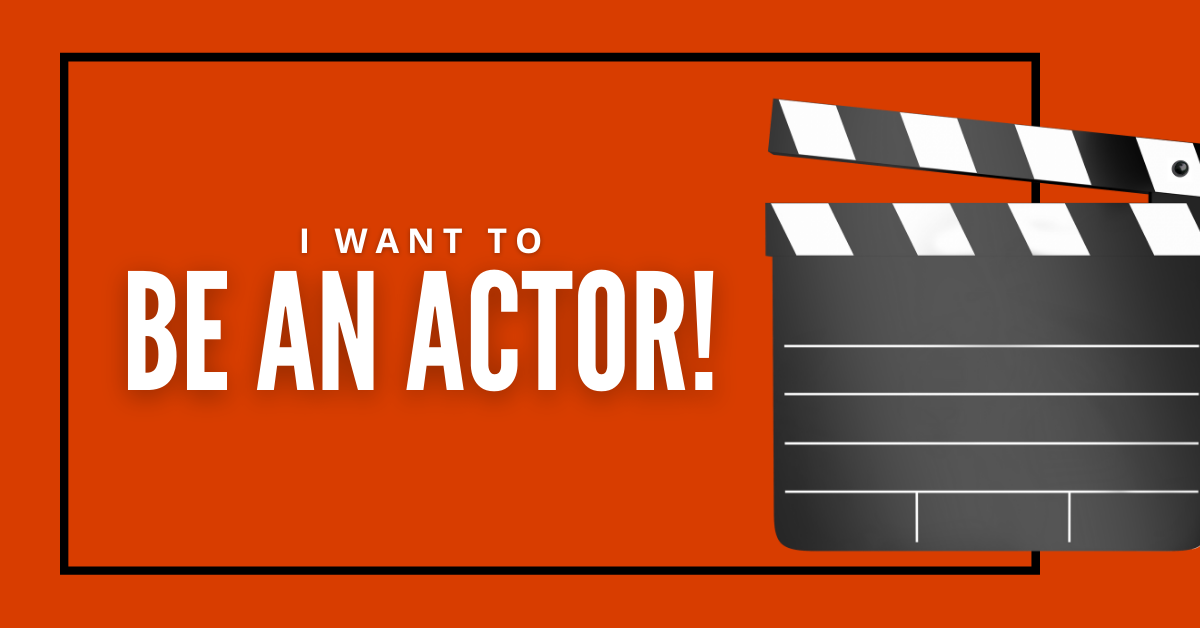I want to be an actor!
It’s an easy thing to say. People say it all the time: I want to act, I’d love to be an actor, I’d die if I wasn’t acting.
But what do these sentences really mean?
- Do you want to be in movies? TV?
- What kind of movies? What kind of TV? Sitcom? Drama? Disney? Would you shun one over another?
- Would you do commercials? Voiceovers?
- Do you want to be in theatre? Straight plays? Musicals?
And there’s more to consider – what level of performing would make you happy?
- Broadway? Regional? Touring? Community?
- Do you want to be a star?
- Do you want to be famous?
- Do you want to act in your spare time?
- Are you happy making a modest living?
- Would you be happy as an extra?
- Would you be happy doing commercials?
Once you’ve defined what you want, and what would make you happy, what are you willing to do to get it? What’s your discomfort level?
- Eat ramen noodles for a year? Five years? Ten?
- Do seventeen odd jobs to pay the rent?
- Sleep on a couch?
- Do a horrible project just because you were cast?
- Work with an abusive director in a wonderful project?
- Do nudity?
There are lots of possibilities to consider, many of which require discomfort.
The sentence is no longer simple.
When you’re thinking “I want to act” there’s no discomfort at all. It’s warm, fuzzy and pleasant. It’s a dream. When you say “I want to act” in your dream it happens instantly. You get the perfect role in the perfect project. Everything is warm, fuzzy and pleasant. But it doesn’t work that way for thousands and thousands of wannabe actors.
Let’s say you’re the most talented person in your school and better still, you’re also the most beautiful. Let’s go even further and say you’ve done some local theatre, and maybe even a local commercial or two. You’re not unwise to how the business works. You’ve even made a specific choice to go to LA instead of New York because you want to be in movies and TV. You pack your life into your thirdhand used car and head to Hollywood. In your very first audition you walk into a room of actors who are not only talented, not only beautiful, but they all look exactly like you. You no longer stand out.
What will you do?
What will you do if you don’t book a gig that first week? That first month? That second month? Six months?
What will you do if your dream doesn’t turn into reality?
There is a vast difference between a dream and a vision. A dream is a wish for something to happen. A vision is a step-by-step action plan.
Consider the notion of running a marathon. Many people say, “I wish I could run a marathon.”
Imagine waking up one morning and running 26.2 miles without any training or preparation. Sounds crazy but every big marathon has hundreds of people like this. And most of them fail miserably.
Running a marathon does not have to work like this. There are hundreds of step-by-step programs freely available to teach anyone how to run a marathon. None of these programs involve wishes – they all involve specific steps. They start out simply: you run X number of times a week designating one of those runs as the “long run.” Over a set number of weeks you slowly increase the length of the “long run.” Each week you add more and more miles until you reach the point where a marathon distance is within grasp. Anything is possible if you break it up into small steps, always moving forward.
So when you’re thinking about pursuing a career as an actor, don’t be the guy who wants to be a marathon runner overnight. Don’t be the actor who says, “I’m going to Hollywood and land a film tomorrow!” You’ll hurt yourself. Instead, put together a strategy of small steps. The finish line will appear further away, but every step you take will be one step closer. And you won’t be sitting around without a plan, waiting to be discovered.
Acting is a fickle business. Some actors do nothing and end up on top. Others craft a specific vision for themselves and get nowhere. Luck is involved. You can’t avoid that. But you can make yourself luckier by making choices. You can decide to go to school. You can decide what your main focus will be. You can decide to take classes. You can be fully prepared when that lucky break comes your way, and you can know what your next step will be if something falls apart.
But wait, you say, I’m just in high school. What can I do? Start by defining your parameters.
Here are ten questions to get you started if you’re thinking about becoming an actor.
1. Who are your favourite actors? Start defining who you like, why you like them, and what about their acting appeals to you. Find interviews where your favourite actor talks about being an actor.
2. What type of acting do you like best? Movies, TV, theatre? What about this type of acting appeals to you?
3. Depending on your preference list five movies/TV shows/plays that you love. Why do you love them? What interests you about this specific genre?
4. In your chosen five, identify your favourite scene or monologue. What do you connect with in this moment? What makes this moment come alive for you?
5. Identify five roles that would you be perfect for. Why? Start thinking about what kind of roles you’d excel in.
6. What audition piece would you choose to demonstrate why you’d be perfect for the part? Start thinking about how to use audition pieces to land parts. Do you have a variety of audition pieces at the ready?
7. What is your current level of expertise? Be honest. What do you know, what skills do you have?
8. How can you further your expertise? Make a list of activities you could do to further your skills as an actor. Do you have access to classes? What can you learn on the internet? Don’t self-censor. Put down everything and anything regardless of time or money.
9. What is standing in your way of becoming an actor? (e.g. You live in a place without access to movie auditions.) List every obstacle.
10. What can you do to overcome these obstacles? Brainstorm on tactics to deal with what’s in your way. Don’t worry about whether or not you can complete these actions, just write them down.
And a bonus question: Where do you want to be in a year’s time?
Some additional thoughts:
If your first thought when you’re listing activities that will further your expertise is “I can’t!” (e.g. I can’t, that’s too expensive. I can’t, there are no classes in my area. I can’t, my parents won’t let me) then acting is probably not for you. You don’t need to have the solution to these problems right now or even this year. But your gut reaction will tell you if you’re truly driven to work toward an acting career.
So what can you do if location is an obstacle? Research summer camps or classes that you could travel to. What if money is an obstacle? Get a part-time job or a summer job and work out how much money you’d have to save to pay for a class. Put your plan on paper so you can show your parents what you’re doing and why you’re doing it.
How do I turn this list into an action plan?
Take each item and list out the steps it would take to complete that item. Some will require more steps than others. Let’s say one of your items is: I need headshots
The steps to acquire headshots would look like this:
- Research what professional headshots look like. Get examples.
- Research what it costs to get headshots done.
- Figure out how I’m going to pay for them.
- Research photographers.
- Choose one.
- Make an appointment.
- Go to the photo shoot.
- Receive contact sheet.
- Choose headshot.
- Get prints made.
Don’t worry about doing all these steps at once. This is a marathon, not a sprint. Divide the list of steps into the following lists:
- Items to do this week.
- Items to do this month.
- Items to do this year.
Choose a specific day each week to check in with your list. Are you on track?
There are so many people who have the dream of becoming an actor. So many people say those words: “I want to be an actor.” How will you be different? What steps will you take to turn those words into a reality?



